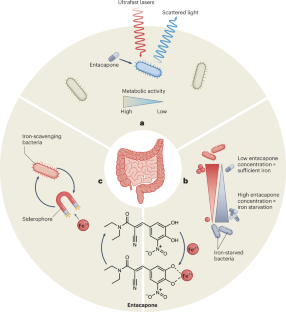Parkinson’s drug starves gut microbes of iron
IF 20.5
1区 生物学
Q1 MICROBIOLOGY
引用次数: 0
Abstract
Entacapone, a drug used in the treatment of Parkinson’s disease, disrupts gut microbial communities by sequestering iron, creating a competitive advantage for iron-scavenging microbes that often carry antimicrobial resistance and virulence genes.

帕金森病药物使肠道微生物缺乏铁元素
恩他卡朋是一种用于治疗帕金森病的药物,它能通过封存铁扰乱肠道微生物群落,为通常携带抗菌药耐药性和毒力基因的铁清除微生物创造竞争优势。
本文章由计算机程序翻译,如有差异,请以英文原文为准。
求助全文
约1分钟内获得全文
求助全文
来源期刊

Nature Microbiology
Immunology and Microbiology-Microbiology
CiteScore
44.40
自引率
1.10%
发文量
226
期刊介绍:
Nature Microbiology aims to cover a comprehensive range of topics related to microorganisms. This includes:
Evolution: The journal is interested in exploring the evolutionary aspects of microorganisms. This may include research on their genetic diversity, adaptation, and speciation over time.
Physiology and cell biology: Nature Microbiology seeks to understand the functions and characteristics of microorganisms at the cellular and physiological levels. This may involve studying their metabolism, growth patterns, and cellular processes.
Interactions: The journal focuses on the interactions microorganisms have with each other, as well as their interactions with hosts or the environment. This encompasses investigations into microbial communities, symbiotic relationships, and microbial responses to different environments.
Societal significance: Nature Microbiology recognizes the societal impact of microorganisms and welcomes studies that explore their practical applications. This may include research on microbial diseases, biotechnology, or environmental remediation.
In summary, Nature Microbiology is interested in research related to the evolution, physiology and cell biology of microorganisms, their interactions, and their societal relevance.
 求助内容:
求助内容: 应助结果提醒方式:
应助结果提醒方式:


